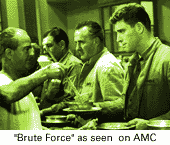"They're gonna break your heart a hundred times when you start to make a movie, over and over again. But that's your job. And if you love your job, it's gonna come out okay. At least you'll get out there what you wanted to do, and tell your story."
The speaker is Richard Brooks, one of Hollywood's greatest storytellers - as well as one of its first "hybrids" as a writer-director. And in this portrait of his career, Brooks relates many funny and touching stories from his days making such classic films as "Cat on a Hot Tin Roof," "Elmer Gantry," "In Cold Blood," "Lord Jim," "The Professionals," and "The Blackboard Jungle."
Brooks started life as Rubin Sacks, the son of Russian immigrants in Philadelphia. He recalls his mother taking him to register for school. "If he misses a day of school, " she told the principal, "that's a problem. He'll be destroyed in this world without an education. If he doesn't learn to read and write, they'll kill him. And if he doesn't go to school to learn to read and write, I'll kill him."
After public school, Brooks went on to Temple University. He never lost his respect for the transforming power of education, which ultimately led to his new life as a writer and director.
Early in his career, he met a man who gave him a crucial piece of advice. Told that Brooks was a writer, the man inquired what he liked to read. Tolstoy? Dostoevsky? Hemingway? Brooks couldn't answer because, he says, "I realized I didn't do much reading." The man said, "If you're gonna be a good writer, you'd better read a thousand words for every one you write. Then maybe you'd have a chance."

 Another wonderful story comes from the director's days in the Marines, where he was assigned to a combat camera unit and sent to the Pacific Theater to shoot a film. While gathering footage on Guam, Brooks asked a Marine commander a question, and got another life lesson. "Is there any way the combat cameramen could carry weapons along with their cameras?" he asked. "Because they're shooting at us and, well, it'd be kind of good to be able to shoot back." The reply: "I want those cameras there, because those are the eyes of the world. And there are no cowards in front of a camera. So shoot the goddamn camera. We'll shoot the bullets."
Another wonderful story comes from the director's days in the Marines, where he was assigned to a combat camera unit and sent to the Pacific Theater to shoot a film. While gathering footage on Guam, Brooks asked a Marine commander a question, and got another life lesson. "Is there any way the combat cameramen could carry weapons along with their cameras?" he asked. "Because they're shooting at us and, well, it'd be kind of good to be able to shoot back." The reply: "I want those cameras there, because those are the eyes of the world. And there are no cowards in front of a camera. So shoot the goddamn camera. We'll shoot the bullets."
After his wartime service, and after numerous rejections, Brooks managed to publish his first novel. Titled "The Brick Foxhole," it dealt with a daring topic for that day, gay bashing. Hollywood bought the book, and promptly changed its subject to anti-Semitism and its title to "Cross Fire."